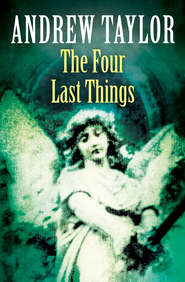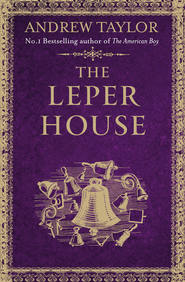По всем вопросам обращайтесь на: info@litportal.ru
(©) 2003-2024.
✖
Fallen Angel
Автор
Год написания книги
2019
Настройки чтения
Размер шрифта
Высота строк
Поля
A cloud slid across the sun.
‘I thought it might be that. It’s getting cold.’ Angel hugged herself, dramatizing the words. ‘Shall we find a cup of coffee? There’s a café on South End Green.’
Before Eddie knew what was happening, they were walking down the hill together. He felt lighter than usual, floating like a spaceman. This can’t be happening to me. Part of him would have liked to run away, but this was swamped by other feelings: running away would be a very rude thing to do; he was flattered to be in Angel’s company, and even hoped that someone he knew would see them; and he also liked the sense, obscure but powerful, that by being together he and Angel were somehow fooling his mother. For once, Eddie was not alone; he was part of a couple, and two was company. Soon they were sitting at a table by themselves, with coffee sending up twin pillars of steam between them.
‘This is nice.’ Angel smiled at him. ‘It’s good to get out. I worry about your mother sometimes. She spends so much time in the house.’
‘Oh, she likes being at home. She’s always been like that, even when my father was alive.’
‘As long as it makes her happy.’
‘She’s getting old,’ Eddie said, meaning that he couldn’t imagine how old people could be happy.
Angel answered the thought, not the words: ‘Old age is very sad. I’d hate to be old.’ For an instant, her face changed: she pressed her lips and frowned; wrinkles gouged their way across her skin, a glimpse of what might be to come. Then she smiled, and the years retreated. ‘That’s one of the things I like about children. It’s impossible to imagine them ever being old.’
Eddie nodded. He thought of Alison again – at present she was in his mind a good deal – and wished with all his heart that she could have stayed for ever young in the summer when they’d played the Peeing Game, and that he could have been young with her. He smiled across the years at Alison.
‘What’s funny, Eddie?’ Angel asked.
‘What? Nothing.’ He bent his head to hide his embarrassment. Steam from the coffee misted his glasses.
‘You don’t mind if I call you Eddie?’
He felt himself blushing. ‘Of course not.’
‘But don’t call me Angela. Horrible name.’
He looked up. She was leaning towards him, her face blurred by the steam like the city by its smog. It seemed to him that her features were dissolving in the vapour. She said something he didn’t catch.
‘What was that?’
‘My friends always call me Angel.’
Over the next four months it seemed natural to keep Thelma in the dark about what was happening, though there was no reason to be secretive about their growing friendship. Eddie derived great pleasure from pretending at home in front of his mother that he and Angel were still on the old footing of lodger and landlady’s son. It amused Angel, too.
‘Children enjoy make-believe,’ she told him on one of their outings. ‘I think I still do.’
They met in a succession of public places – cinemas, Primrose Hill, the National Portrait Gallery, a coffee shop attached to an Oxford Street store, a pub near the Heath where children played while their parents drank.
Being with Angel allowed Eddie to watch children without worrying about what adults might be thinking. After all, he and Angel were roughly the same age: they might be taken for a married couple; in any case, a man and a woman together were much less threatening than a single man.
Once, in the garden outside the Hampstead pub, a little girl fell off a swing and scraped her knee. Angel picked her up and calmed her down. Eventually the child managed to tell them that her mother was inside the pub.
‘Then we shall go and find your mummy.’ Angel picked up the child, who was no more than three, and handed her to Eddie. ‘This nice man will give you a ride.’
The girl nestled in Eddie’s arms. He could not help wondering whether Angel had known that carrying her would give him pleasure. The three of them went into the pub.
‘Where’s Mummy?’ Angel asked the girl.
The mother found them first. She rushed in front of Angel and snatched her child from Eddie. She clung so tightly to the little girl that the latter, until then perfectly happy, began to cry.
The woman stared at Eddie, her face reddening. ‘What happened? What –?’
Angel cut in with an explanation which was an implicit accusation, delivered in her clear, confident voice. The mother reacted with an unlovely mixture of gratitude, guilt and surliness. She was a squat little woman in a long, dusty skirt; she wore no make-up and her arms were tattooed; piggy eyes glinted behind gold-rimmed glasses. She was also quite young, Eddie realized, perhaps not much older than the girls he had taught at school.
‘You can’t be too careful. Not these days,’ she said in an unconscious echo of Thelma. She backed away from them, swallowed the rest of her drink and towed the child outside.
Eddie and Angel queued at the bar.
‘If I hadn’t been with you,’ Angel said casually, ‘that wretched woman would probably have thought you were trying to steal her child.’
As autumn turned to winter, Thelma seemed to sense that the atmosphere in the house had changed, that the emotional balance had tilted away from her. She grumbled more about Angel to Eddie. She became suspicious, wanting to know exactly where he’d been. There was not an open quarrel between her and Angel, but the old cordiality was no more than a memory.
Eddie was cautious by nature. (It was this which had kept him away from the networks of people who shared his special interests; he knew they existed because he read about them in the newspapers.) He did not want a rift with his mother. Sometimes he tried to imagine what life would be like if he and Angel could afford a flat or even a small house together. But financially this was out of the question. He had nothing to live on except what the state and his mother doled out to him.
It was wiser to keep a foot in both camps, at least for the time being. This was why Eddie did not tell Angel about his mother’s snooping. He did not want to run the risk of provoking a quarrel between them.
The policy worked well until midway through January. One evening Eddie ran downstairs. He was due to meet Angel in Liberty’s in Regent Street: they planned to see a film and then have a pizza before coming home.
‘Eddie,’ Thelma called from the kitchen. ‘Come in here a moment.’
He glanced at his watch, irritated because he was already a little on the late side and he didn’t like to keep Angel waiting. He hesitated in the kitchen doorway. His mother was sitting at the table, breathing heavily. Her colour was high and there were patches of sweat under her arms.
‘I’m in a bit of a hurry.’
‘Where are you off to?’
‘Just out.’
‘You’re always going out these days.’
‘Just a film.’
Thelma’s face darkened still further. ‘You’re seeing that woman. Go on, admit it.’
Surprised by the sudden venom, Eddie took a step backwards into the hall. ‘Of course not.’ Even to himself, his voice lacked conviction.
‘I can smell her on you. That perfume she wears.’
Powerless to move, he stared at her.
‘I tell you one thing,’ Thelma went on, ‘she’s paid up till the end of the week, but after that she’s out on her ear.’
‘No!’ The word burst out of Eddie before he could stop himself. ‘You can’t do that. There’s no reason to do that.’
‘She fooled me at the start, I admit that. But I’m not alone in that. She’s fooled everyone.’ Thelma tapped a sturdy manila envelope which lay on the table before her. ‘Wait till Mrs Hawley-Minton hears about this. Unless she’s in it, too. It’s fraud, I tell you, barefaced fraud. It’s a matter for the police, I shouldn’t wonder.’
Eddie stared at her. ‘What do you mean? Are you all right?’











